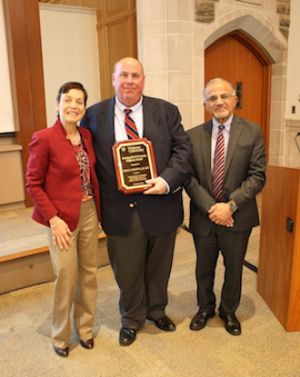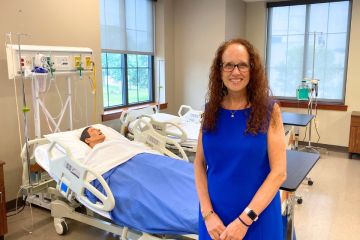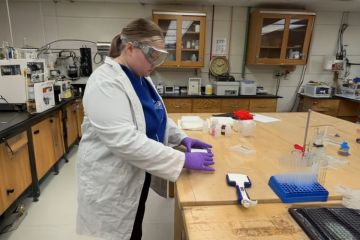Teaching Excellence

Widener University honored top faculty members in the areas of teaching innovation, research, civic engagement and institutional leadership at its annual Faculty Awards banquet held Wednesday, Oct. 24.
“Widener faculty members innovate in the classroom and serve as models for excellent teaching. They are exceptionally engaged citizens who teach others how to transform lives,” Widener President Julie E. Wollman said at the program. “They serve as selfless, energetic leaders and mentors on a campus committed to shared governance, and they work with students to research solutions and provide insights into our most vexing global problems. They are leaders in their professions and in our community.”
The honorees included:
School of Business Administration Professor Kenn B. Tacchino was named distinguished university professor. This award is given to recognize individual faculty members of distinction and demonstrates to the broader community that Widener is committed to recognizing excellence in teaching, scholarship and service throughout the faculty member’s career. Tacchino will serve as a distinguished professor for three years.
Tacchino is a leading expert in the financial services field. He holds the Joseph E. Boettner/Davis W. Gregg Chair of Financial Planning. He created the Retirement Income Certified Professional (RICP) designation for experienced professionals and more than 14,000 students have completed.
School of Nursing Assistant Professor Brenda Kucirka received the Civic Engagement Award, which recognizes sustained outstanding contributions to Widener’s civic engagement mission through her teaching and research.
Kucirka’s commitment to transforming students’ self-awareness, capacity for empathy, and critical insights into the needs of the community has resulted in a strengthened sense of self-worth and self-efficacy among them. A service-learning fellow, Kucirka has collaborated with many organizations in Chester and the surrounding community to develop partnerships with common goals of validating and valuing the voice of vulnerable and marginalized populations, empowerment, and advocating for social justice.
College of Arts and Sciences Professor David J. Coughlin received the Outstanding Researcher Award. It recognizes a faculty member who has exhibited distinction in scholarly work and has made a significant contribution through research to advancing the profession or discipline and the university’s mission.
Coughlin’s impressive scholarly productivity and integrative research collaborations with students and faculty colleagues on subjects ranging from the effect of climate change on fish biology to neural physiology to the biomechanics of plant tissue include 42 career publications, including seven in the last five years. A major proponent of undergraduate research, he has had more than 30 student co-authors on his publications.
College of Arts and Sciences Professor Loyd Bastin received the Faculty Institutional Leadership Award. It recognizes a record of leading initiatives that further the university’s vision, mission and strategic objectives.
Bastin has been an institutional leader in multiple realms: chair of Faculty Council Academic Affairs, coordinator of undergraduate research, co-director of the Summer Research Program, co-chair of the University Sustainability Council, and chair of the Department of Chemistry. In these leadership roles, he has worked with university colleagues to advance undergraduate research, sustainability, and rigorous academics.
The Fitz Dixon Innovation in Teaching Award is given to an individual or group who have designed, implemented and assessed an innovative or experimental teaching and learning project. The honor was shared by School of Engineering Assistant Professor Anita Singh, and Assistant Professor Susan Mills and Director for the Center of Simulation and Computerized Testing Dawn Ferry. Both Mills and Ferry work within the School of Nursing.
The engineering and nursing team has jointly established an interdisciplinary experiential course that incorporates innovative and adaptive teaching techniques to enhance biomedical engineering and nursing education. This novel and transformative undergraduate course acts to inform the application of biomedical principles to real life and complex healthcare situations.




